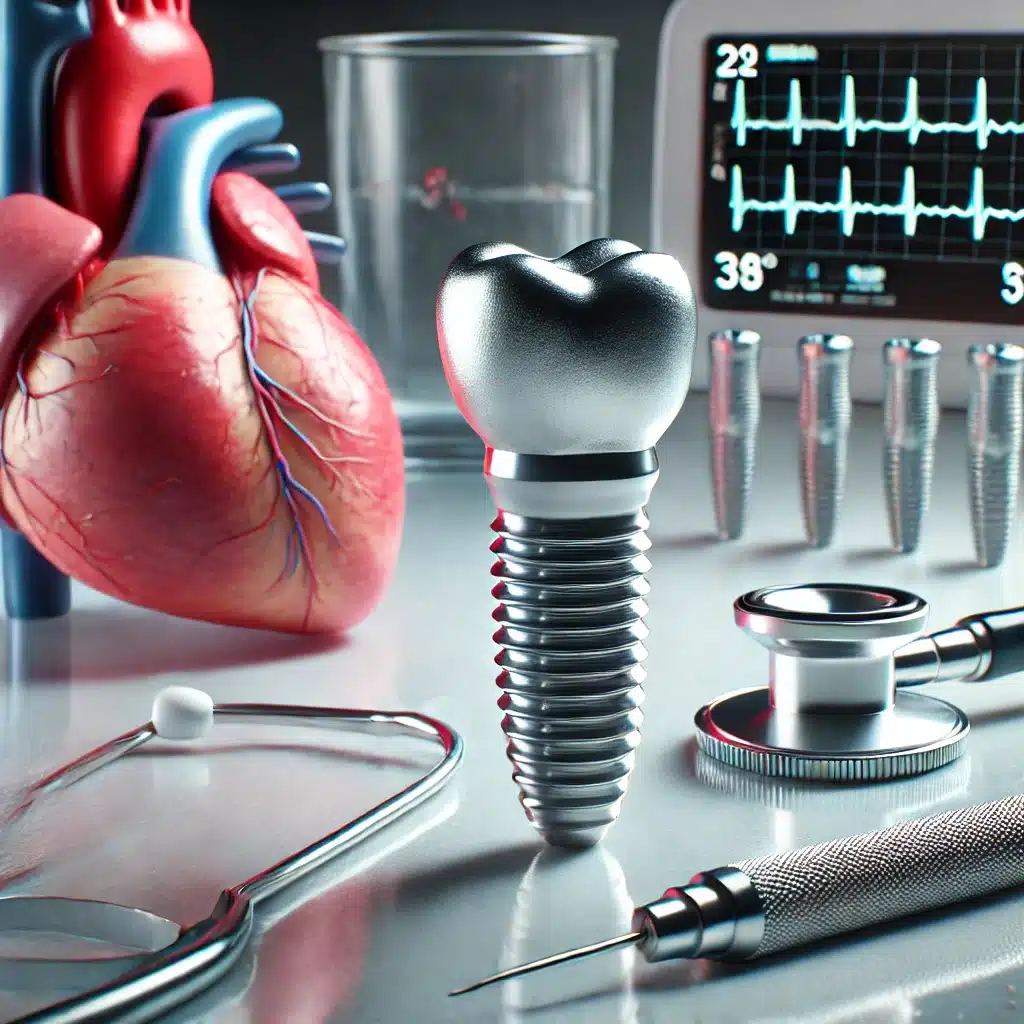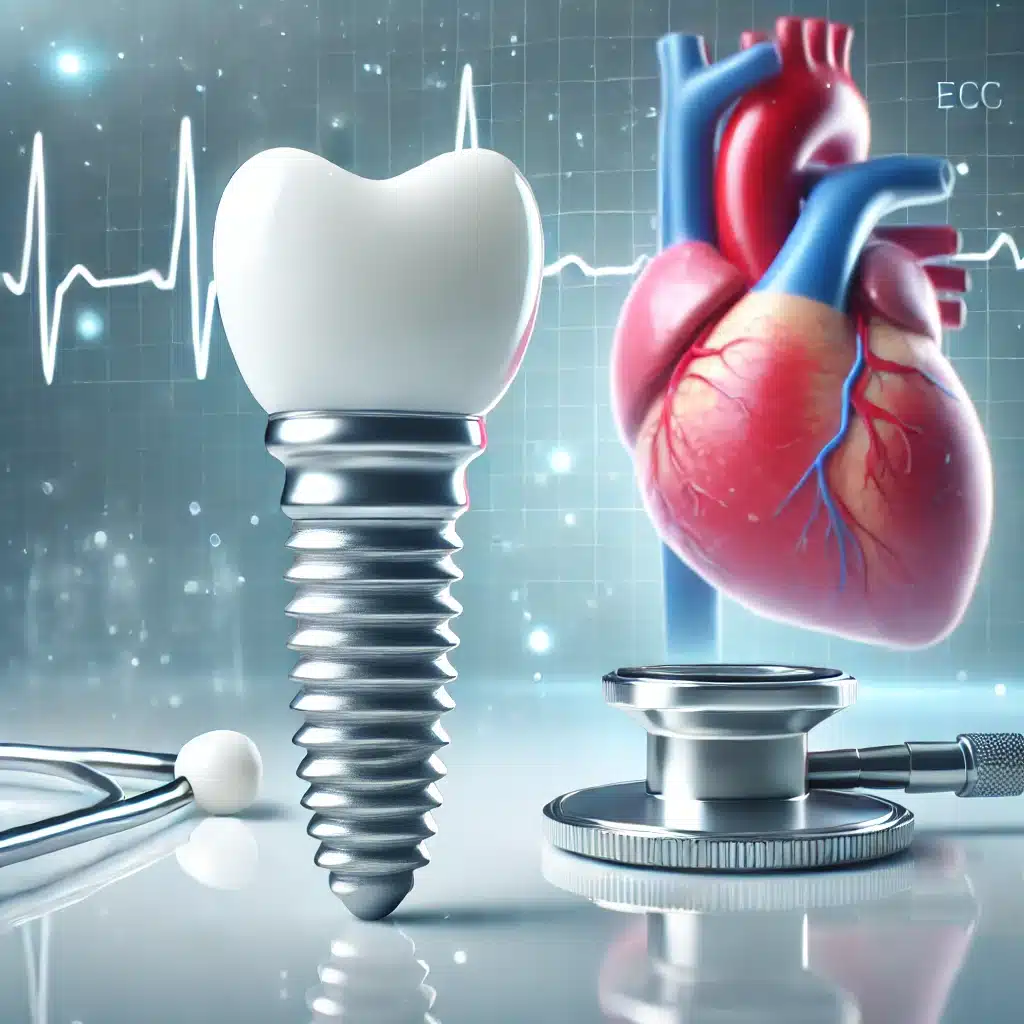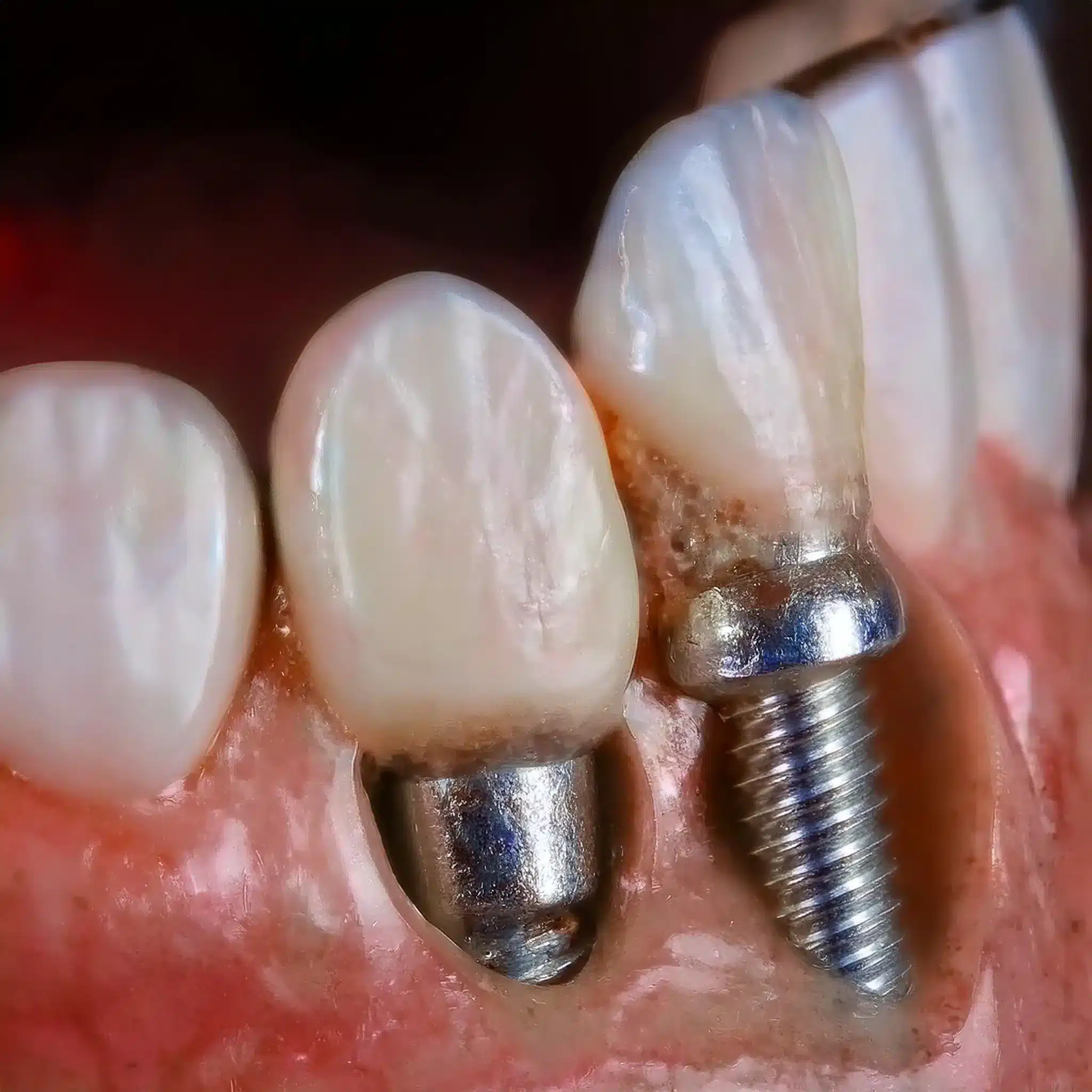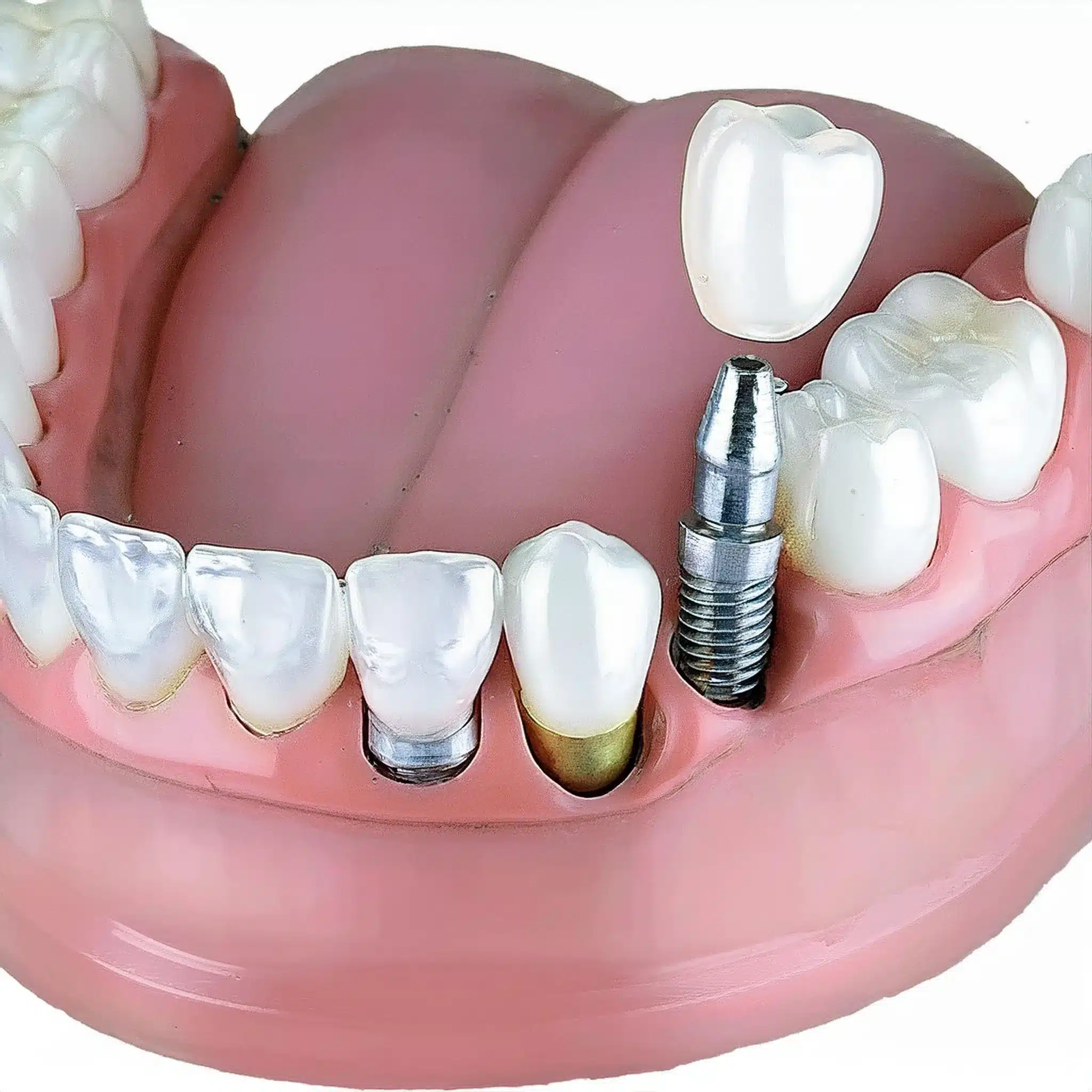Dental implants and heart diseases are a big concern for many people looking to replace their teeth.
If you’re wondering if dental implants are safe for your heart health, you’re not alone; many people with pre-existing heart conditions have the same concern.
Are Dental Implants Safe for people with Heart Problems?
Dental implants are safe for people with heart conditions but planning and consultation with your healthcare professional are key to minimizing risks. Immediate and delayed dental implants have the same failure rates, and advancements in implant materials and design, like bioactive materials and 3D printing, can further increase safety and effectiveness.

How Do Dental Implants Affect Heart Health?
Dental implant procedures are a popular option for tooth replacement, but their effect on heart health is a concern for many patients with heart disease.
Knowing the risks and benefits is key, especially for those with pre-existing heart conditions.
Bacterial Endocarditis
Bacterial endocarditis is a serious infection of the heart’s inner lining caused by bacteria entering the bloodstream during dental procedures.
While dental implants themselves are not directly linked to an increased risk of endocarditis, the procedure can introduce bacteria that can harm heart health.
Immediate and Delayed Implants: Research shows no significant difference in infection rates between immediate and delayed dental implants so the timing of the procedure doesn’t increase the risk of bacterial endocarditis (1).
Material Advancements: New bioactive materials and 3D printing technologies are being developed to improve osseointegration and reduce infection risks, which can lower the risk of bacterial endocarditis (2).
Ποιος μπορεί να βάλει οδοντικά εμφυτεύματα; Γενικά, οποιοσδήποτε με καλή γενική υγεία και επαρκή οστική πυκνότητα μπορεί να είναι υποψήφιος για οδοντικά εμφυτεύματα.
Ωστόσο, ορισμένες συνθήκες υγείας και φάρμακα μπορούν να επηρεάσουν την επιτυχία της διαδικασίας.

Good Oral Hygiene for Heart Health
Good oral hygiene is key to reducing the risk of infections that can affect heart health.
Proper care of dental implants is part of this.
Regular Cleaning: Cleaning dental implants regularly can prevent bacteria buildup that can cause infections.
Professional Check-Ups: Regular dental check-ups are important to monitor dental implants and prevent complications that can affect heart health.
Heart Patients Considering Dental Implants
Dental implants are safe for people with heart conditions but some precautions are necessary to minimize risks.
Dental implants for seniors have become increasingly popular due to their durability and effectiveness, showing no significant difference in failure rates between immediate and delayed placement.
Planning and consultation with your healthcare professional are key to a successful outcome.
Pre-Surgery Checklist for Heart Patients
Before undergoing dental implant surgery, heart patients should do the following to prepare and minimize complications:.
Consultation with Healthcare Providers: Discuss your medical history with your dentist and cardiologist to get a full understanding of your heart condition and the risks involved (3).
Medication Review: Review all medications with your healthcare providers to see if any need to be stopped or adjusted before surgery.
Some medications need to be paused or adjusted during the procedure (5).
Lifestyle Changes: Make lifestyle changes like quitting smoking and improving diet to improve your overall health and reduce surgical risks (6).
| Checklist Item | Περιγραφή | Σημασία |
|---|---|---|
| Consultation with Healthcare Providers | Discuss medical history with dentist and cardiologist to understand heart condition risks. | Ensures comprehensive risk assessment and planning. |
| Medication Review | Review medications to determine necessary adjustments before surgery. | Prevents complications during the procedure. |
| Lifestyle Adjustments | Implement changes such as quitting smoking and improving diet. | Enhances overall health and reduces surgical risks. |
Post-Surgery Care and Follow-Up
After a dental implant procedure, heart patients should follow these care guidelines to ensure a smooth recovery and prevent complications.
Monitoring for Infection: Watch out for signs of infection like swelling, pain or fever and report to your healthcare provider immediately to prevent bacterial endocarditis (4).
Follow-Up Appointments: Schedule follow-up appointments with your dentist and cardiologist to monitor healing and address concerns (2).
Medication Regimen: Continue taking prescribed medications as directed by your healthcare providers to aid in recovery and heart health (5).
| Care Item | Περιγραφή | Σημασία |
|---|---|---|
| Monitoring for Signs of Infection | Watch for symptoms like swelling, pain, or fever and report them immediately. | Prevents complications such as bacterial endocarditis. |
| Regular Follow-Up Appointments | Schedule visits with your dentist and cardiologist to monitor healing. | Ensures any concerns are addressed promptly. |
| Adherence to Medication Regimen | Continue taking prescribed medications as directed. | Supports recovery and maintains heart health. |
Heart Conditions Before and After Dental Implants
For people with heart conditions, managing heart health before and after dental implant treatment is key to a successful outcome and minimizing risks.
Cardiologist Consultation
Before getting dental implants, a cardiologist consultation is necessary.
This step will tailor the treatment plan to the patient’s heart condition.
Personalized Assessment: The cardiologist will assess the patient’s heart health and give recommendations specific to their condition so both the dental and cardiac teams are on the same page (2).
Risk Assessment: Understanding the risks of dental procedures for heart patients is important.
This includes the risk of increased blood pressure or arrhythmias during the procedure (3).
Antibiotic Prophylaxis and Safety Measures
Antibiotic prophylaxis is recommended for heart patients undergoing dental procedures to prevent infections like infective endocarditis.
Antibiotic Protocols: According to clinical guidelines, patients with certain heart conditions may need antibiotics before dental implant surgery to reduce the risk of infection (7).
Safety Measures: Implementing safety measures like monitoring vital signs and having emergency protocols in place can manage any complications during the procedure (6).

Συμπέρασμα & βασικά συμπεράσματα
Βασικά συμπεράσματα:
Dental implants are safe for people with heart conditions, but proper planning and consultation with healthcare professionals are necessary.
Immediate and delayed dental implants have no significant difference in failure rates.
New implant materials and designs, like bioactive materials and 3D printing, can improve safety and effectiveness.
Good oral hygiene and regular check-ups are important to prevent infections that can affect heart health.
Consultation with a cardiologist and adherence to antibiotic prophylaxis protocols are necessary for heart patients before and after dental implant surgery.
Συμπέρασμα:
Dental implants can be a safe and good option for people with heart conditions if proper precautions and planning are in place.By understanding the risks and benefits and following the guidelines, patients can enjoy the benefits of dental implants while minimizing the risks to their heart health.
ΣΥΧΝΈΣ ΕΡΩΤΉΣΕΙΣ
Αναφορές
Esposito M, et al. Interventions for replacing missing teeth: dental implants in fresh sockets versus delayed implants. Cochrane Database Syst Rev. 2006;(3):CD005968.
Άρθρο: Interventions for replacing missing teeth: dental implants in fresh sockets versus delayed implantsPanchal M, et al. Dental implants: A review of types, design analysis, materials, additive manufacturing methods, and future scope. Procedia CIRP. 2022;100:214-219.
Άρθρο: Οδοντικά εμφυτεύματα: υλικά, μέθοδοι προσθετικής κατασκευής και μελλοντικό πεδίο εφαρμογήςGuillaume B. Dental implants: A review. Eur Ann Otorhinolaryngol Head Neck Dis. 2016;133(1):30-35.
Άρθρο: Οδοντικά εμφυτεύματα: ΑνασκόπησηAlbrektsson T, et al. Dental implants: a review. J Clin Periodontol. 1992;19(6):331-337.
Άρθρο: Οδοντικά εμφυτεύματα: μια ανασκόπησηPapaspyridakos P, et al. Systematic review of the survival rate and incidence of biologic, technical, and esthetic complications with fixed implant rehabilitations for edentulous patients. Int J Oral Maxillofac Implants. 2012;27(1):102-110.
Άρθρο: Systematic review of the survival rate and incidence of biologic, technical, and esthetic complications with fixed implant rehabilitations for edentulous patientsAlbrektsson T, et al. The long-term efficacy of currently used dental implants: a review and proposed criteria of success. Int J Oral Maxillofac Implants. 1986;1(1):11-25.
Άρθρο: Η μακροπρόθεσμη αποτελεσματικότητα των οδοντικών εμφυτευμάτων που χρησιμοποιούνται σήμερα: ανασκόπηση και προτεινόμενα κριτήρια επιτυχίαςBuser D, et al. 20-year study of osseointegrated implants in the edentulous maxilla. Int J Oral Maxillofac Implants. 1997;12(1):61-68.
Άρθρο: 20-year study of osseointegrated implants in the edentulous maxilla


